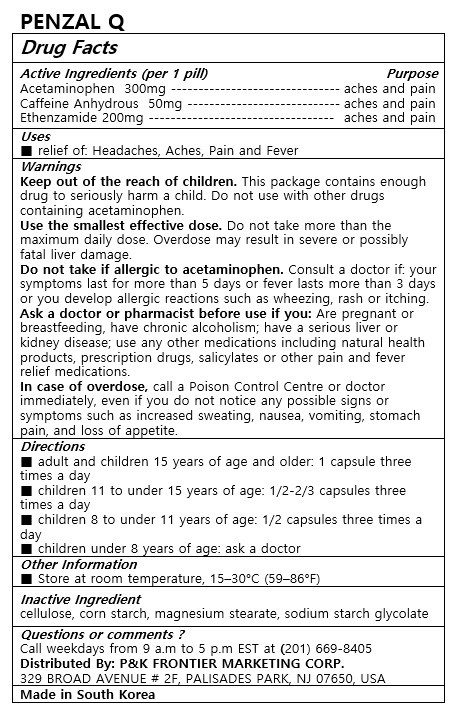Penzal Q | Acetaminophen, Ethenzamide, Caffeine Anhydrous Tablet while Breastfeeding

What is Penzal Q | Acetaminophen, Ethenzamide, Caffeine Anhydrous Tablet used for?
Brief: Relief of: Headaches, Aches, Pain and Fever
Can I continue breastfeeding if I am using Penzal Q | Acetaminophen, Ethenzamide, Caffeine Anhydrous Tablet? How long does it stays in breast milk?
Penzal Q | Acetaminophen, Ethenzamide, Caffeine Anhydrous Tablet Breastfeeding Analsys
Acetaminophen while Breastfeeding
SafeCAS Number: 103-90-2
Excreted in very low amount into breast milk. Infant intake may be lower than 4% of usual pediatric dose. The American Academy of Pediatrics rates it as compatible with Breastfeeding.
Caffeine while Breastfeeding
Low RiskCAS Number: 58-08-2
Trimethylxanthine component which is present in many compounds like decongestant or pain relief drugs (50 to 100 mg per unit) . It is also present in many infusion beverages (coffee, tea, mate, guarana) and other drinks with allegedly energizing properties. See also Coffee, Caffeine (beverages). At a dose higher than 300 mg a-day may induce nervousness and irritability in the infant. Intravenous high doses used to treat post-epidural anesthesia headache within 2-3 days after delivery, before mature breast milk comes, are compatible with breastfeeding. High doses used Intravenously to treat headache related to epidural should be regarded as compatible with breastfeeding only in the 2-3 days before milk comes in. Elimination period may last from few hours in adults, to 3-4 days in the newborn infant. American Academy of Pediatrics: Maternal Medication Usually Compatible With Breastfeeding.
Penzal Q | Acetaminophen, Ethenzamide, Caffeine Anhydrous Tablet Breastfeeding Analsys - 2
Acetaminophen while Breastfeeding
CAS Number: 103-90-2
Acetaminophen is a good choice for analgesia, and fever reduction in nursing mothers. Amounts in milk are much less than doses usually given to infants. Adverse effects in breastfed infants appear to be rare.
Caffeine while Breastfeeding
CAS Number: 58-08-2
Caffeine appears in breastmilk rapidly after maternal ingestion. Insufficient high-quality data are available to make good evidence-based recommendations on safe maternal caffeine consumption.[1] Fussiness, jitteriness and poor sleep patterns have been reported in the infants of mothers with very high caffeine intakes equivalent to about 10 or more cups of coffee daily. Studies in mothers taking 5 cups of coffee daily found no stimulation in breastfed infants 3 weeks of age and older. Some experts feel that a maternal intake limit of 300 mg daily might be a safe level of intake.[2] However, preterm and younger newborn infants metabolize caffeine very slowly and may have serum levels of caffeine and other active caffeine metabolites similar to their mothers' levels,[2][3][4] so a lower intake level preferable in the mothers of these infants. Other sources of caffeine, such as cola and energy drinks, yerba mate or guarana, will have similar dose-related effects on the breastfed infant. Coffee intake of more than 450 mL daily may decrease breastmilk iron concentrations and result in mild iron deficiency anemia in some breastfed infants.[5]
What should I do if I am breastfeeding mother and I am already exposed to Penzal Q | Acetaminophen, Ethenzamide, Caffeine Anhydrous Tablet?
Not much study has been done on safety of Penzal Q | Acetaminophen, Ethenzamide, Caffeine Anhydrous Tablet in breastfeeding and its ingredients. Even we do not have complete information about usage of Penzal Q | Acetaminophen, Ethenzamide, Caffeine Anhydrous Tablet in breastfeeding so at this point a trained medical professional could be your best bet. If you observe anything abnormal with your baby please contact 911.
My doctor has prescribed me Penzal Q | Acetaminophen, Ethenzamide, Caffeine Anhydrous Tablet, what should I do?
If your doctor considers Penzal Q | Acetaminophen, Ethenzamide, Caffeine Anhydrous Tablet safe enough to prescribe for you that means its benefits should outweigh its known risks for you.
If I am using Penzal Q | Acetaminophen, Ethenzamide, Caffeine Anhydrous Tablet, will my baby need extra monitoring?
We are not Sure, Please check with your healthcare provider or doctor.
Who can I talk to if I have questions about usage of Penzal Q | Acetaminophen, Ethenzamide, Caffeine Anhydrous Tablet in breastfeeding?
US
National Womens Health and Breastfeeding Helpline: 800-994-9662 (TDD 888-220-5446) 9 a.m. and 6 p.m. ET, Monday through Friday
UK
National Breastfeeding Helpline: 0300-100-0212 9.30am to 9.30pm, daily
Association of Breastfeeding Mothers: 0300-330-5453
La Leche League: 0345-120-2918
The Breastfeeding Network supporter line in Bengali and Sylheti: 0300-456-2421
National Childbirth Trust (NCT): 0300-330-0700
Australia
National Breastfeeding Helpline: 1800-686-268 24 hours a day, 7 days a week
Canada
Telehealth Ontario for breastfeeding: 1-866-797-0000 24 hours a day, 7 days a week
